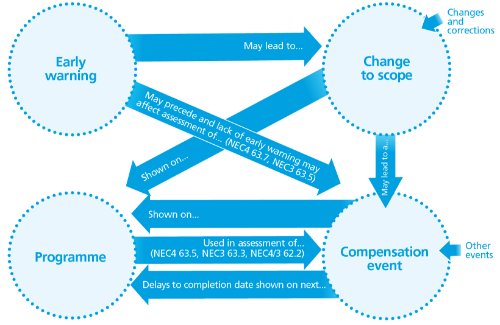
NEC contracts are designed as a series of clear, separate and well-defined processes. This article is based on a flipchart used by the author in training sessions which seems to help in highlighting the all-important links between some of the key processes in any NEC contract. These are summarised in Figure 1.
The processes are almost identical in the NEC4 and NEC3 Engineering and Construction Contract (ECC), Professional Service(s) Contract (PSC) and Term Service Contract (TSC) – and the changes between NEC4 and NEC3 in these processes are minimal. The terms and citations used in this article relate to NEC4 ECC so for other contracts read ‘contractor’ as consultant in PSC; ‘project manager’ as service manager in TSC and NEC4 PSC4 (employer in NEC3 PSC)’; and ‘scope’ as works information and service information in NEC3 ECC and NEC3 TSC respectively.

Figure 1. Key NEC process and the links between them
Early warning
Early warning as described in clause 15 (clause 16 in NEC3 ECC and NEC3 TSC) is a key NEC process, requiring both the contractor and project manager to, ‘give an early warning by notifying the other as soon as either becomes aware of any matter which could increase the total of the Prices, delay Completion, delay meeting a Key Date or impair the performance of the works in use’ (bullets omitted).
It is a matter which could happen but it is not a compensation event. However, as shown in Figure 1, an early warning may precede a compensation event arising from the same matter. Also, an early warning and the discussion it should prompt in an early warning meeting (risk reduction meeting in NEC3 contracts) may lead to the project manager instructing a change to the scope.
The early warning clause is explicit that an early warning does not have to be notified if the matter has already been notified as a compensation event. The other key link between early warning and compensation events is the clear commercial incentive for the contractor to give the early warning.
Clause 61.5 says, ‘If the Project Manger decides that the Contractor did not give an early warning of the event which an experienced contractor could have given, the Project Manager states this in the instruction to the Contractor to submit quotations’. In other words, ‘you should have told me’.
The clause links directly to clause 63.7 (NEC3 clause 63.5), which says, ‘If the Project Manager has stated in the instruction to submit quotations that the Contractor did not give an early warning of the event which an experienced contractor could have given, the compensation event is assessed as if the Contractor had given the early warning.’ In other words, ‘we will assess it as if you had told me’.
The situation is perhaps best illustrated by a true story. A contractor was told in the scope that the client would provide power at point A but, when the contractor plugged in, there was no power. The contractor should have notified a compensation event or an early warning but did not. Instead, to keep things moving, it brought in a generator. Seven weeks later the contractor’s commercial manager noticed the generator and notified a compensation event asking for the £7000 cost (defined cost plus fee) of the generator. But if, as required, the contractor had notified the early warning, the client would have known of the problem and told the contractor of an alternative power source at point B, which was only 20m from point A. The compensation event was assessed as the cost of the additional cable to get to B compared with that required to get to A, which, at £2.50 per m of cable, was just £50.
Changes to scope
The project manager is the only person or organisation that can change the scope using an instruction under clause 14.3 (20.2 in NEC3 PSC). Any change to the scope should be reflected in the next update to the programme (clause 32.2), as shown on Figure 1.
Any change to the scope will be a compensation event under clause 60.1(1) unless it is, ‘a change made in order to accept a Defect or a change to the Scope provided by the Contractor which is made at the Contractor’s request or in order to comply with the Scope provided by the Client’ (bullets omitted). If the change is a compensation event, then the project manager must notify that compensation event (clause 61.1) immediately after the instruction to change the scope. Notification requires a separate communication (clause 13.7).
Programme
Clause 32.2 (ECC and PSC) (similar to NEC4 TSC clause 34.2 for the task order programme) says, ‘The Contractor submits a revised programme to the Project Manager for acceptance within the period for reply after the Project Manager has instructed the Contractor to, when the Contractor chooses to and, in any case, at no longer interval than the interval stated in the Contract Data from the starting date until Completion of the whole of the works’ (bullets omitted).
It is useful to consider the programme as being required to be routinely updated showing latest progress and the effect of both changes to the scope and other compensation events. If these are not shown, the programme will not be ‘realistic’ (clause 31.3) and so should not be accepted by the project manager.
Compensation events
Compensation events may arise from a umber of events, one of which (by far the most common) is a change to the scope.
If a compensation event happens, that compensation event must be notified separately y project manager (clause 61.1) or contractor (clause 61.3). In the case of the contractor notification under clause 61.3, there is a subtlety: ‘The Contractor notifies the Project Manager of an event which has happened or which is expected to happen as a compensation event if the Contractor believes that the event is a compensation event and the Project Manager has not notified the event to the Contractor.’
So, the contractor notifies the compensation if it is has happened or is ‘expected to happen’. If it only ‘could’ happen, the contractor should be notifying instead with an early warning.
The links between compensation events and the programme are critical for the proper management of an NEC contract and are illustrated on Figure 1. First, in the routine update to the programme, as noted above, the effect of compensation events should be included. This may include a delay to the contractor’s planned completion. But it should not include any delay to the (required) completion date, at least not until that has been agreed in an ‘implemented’ compensation event.
The following steps should then be undertaken in assessing the effect of a compensation event on time.
- Clause 63.5 (NEC3 clause 63.3) requires the project team to start with the accepted programme current at the ‘dividing date’. This is the NEC4 term for the time up to which the project team can use actual data and from which they forecast the effect of the event. It is a significantly neater that the equivalent wording, relating to cost, in NEC3 clause 63.1.
- However, clause 62.2 requires the quotation for the compensation event to include the effect of the compensation on ‘remaining work’. To do that project team first has to update the accepted programme that was current at the dividing date to the real situation (remaining work) at the dividing date. The effects of the compensation event are then added. In effect the project team is using a ‘mark-up’ of the accepted programme to evaluate the compensation event. In doing so they are not updating the accepted programme itself. Revising the accepted programme is only done when set out in clause 32.2 as described under programme, above.
- If the compensation causes a delay to planned completion, clause 63.5 (NEC3 clause 63.3) is clear that the (required) completion date is delayed by the same period. When the compensation event is ‘implemented’ (finalised) in accordance with clause 66.1 (NEC3 clause 65.1), the delay to the completion date caused by the event is fixed. This delay to the completion date will then be shown on the next update to the accepted programme.
The link between clauses 63.5 and 62.2 is not immediately obvious on a first read of the contract. It was the subject of an NEC Practice Note (NEC, 2017).
NEC is completely rigorous and all compensation events are, in theory, to be evaluated separately as described above. However, if there are numerous compensation events in a short period, many teams will agree the pragmatic solution of looking at their combined effect on the programme and then ‘sharing out’ the combined effect on the completion date between the events.
Talk and listen to each other
Talking and listening to each other is the author’s simplistic interpretation of the NEC’s clause 10 obligation to, ‘act in a spirit of mutual trust and co-operation’. The only meeting stated in the contract is the early warning meeting (risk reduction meeting in NEC3). But anyone who knows NEC knows it is essential to have other routine meetings, at least about programme and compensation events. Others may be on payment, design and health and safety.
In the case of programme, one of the things to be shown on the programme (in clause 31.2) is, ‘the order and timing of the work of the Client and Others as last agreed with them by the Contractor or, if not so agreed, as stated in the Scope’. There is no formal clause for this agreement by the contractor, but it will need a meeting. Good practice is an at least monthly meeting prior to formal submission of a revised programme (which is typically required monthly). At this meeting the contractor should explain any changes and hope to make it easy for the project manager quickly to accept the revised programme when formally submitted.
In the case of compensation events, there is no formal requirement in the contract for either a register of compensation events of a meeting to discuss them. Again, to make NEC work, a combined shared register and a routine meeting between the commercial staff from contractor and project manager are essential to negotiate and agree the time and cost impact of each event. That meeting will also be used to agree where alternative quotations are required ‘after discussing with the Contractor’ (clause 62.1), and to agree which project manager assumptions should be stated by the project manager (clause 61.6).
Summary
The NEC is a process-based contract. It is hoped this article highlights the need to understand and use the key processes and the links between them, namely early warning, changing the scope, programme and compensation events. All are illustrated in Figure 1.
Reference
NEC (2017) Assessing delays due to compensation events, ECC Practice Note 1, October 2017, free online.




